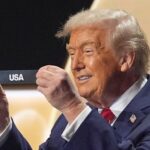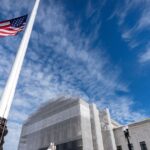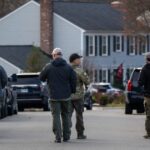
A Pennsylvania police officer on Thursday told lawmakers that a local operator’s bullet ultimately stopped failed assassination attempt shooter Thomas Crooks before the U.S. Secret Service fatally shot him.
Adams Township Police Department Sgt. Edward Lenz’s testimony came Thursday morning during a hearing before the House Trump Assassination Attempt Task Force, which has been tasked with investigating the July 13 shooting of former President Trump, the first of two recent assassination attempts against him.
“Across the two counter assault teams, the quick reaction force, three sniper teams and support personnel, we provided total manpower of 44 persons, exceeding the number requested by the Secret Service,” Lenz, a commander with the Butler County Emergency Services Unit (ESU), said in his opening remarks. “At no point during the planning process was Butler County ESU asked to secure the AGR complex, nor the perimeter surrounding that area. At no point during the planning process was Butler ESU asked to deploy a sniper team to the roof of the AGR complex.”
Butler County snipers inside the AGR building could not see the shooter from the roof of the AGR complex, nor was that part of their duties for the day, Lenz added.
A member of the quick response force, however, noticed several suspicious people in the area, one of whom turned out to be the shooter.
A Beaver County sniper took a photo of the suspicious male near the AGR building and a photo of the shooter using a range finder pointing toward the stage, who was later identified as Crooks.
The sniper reported that information to the Pennsylvania State Police, Lenz explained. The FBI previously said this sighting occurred around 5:10 p.m. on July 13, one hour and one minute before Crooks began shooting.
Soon afterward, when it became clear that a threat was on the roof of the AGR building, an operator with Butler County ESU exited the red barn from behind the stage where Trump was speaking and monitored the AGR building area, Lenz said. He “quickly identified” where the shots were coming from, located the shooter, and fired one round at Crooks with his rifle, “which caused the shooter to recoil and briefly fall out of sight,” the Adams Township officer testified.
“He did this less than six seconds after shots began… at a distance of approximately 110 yards,” Lenz said.
A Secret Service counter sniper then fired the fatal shot that neutralized Crooks on the roof of the AGR building, where he was perched with a direct line of sight to Trump.
The FBI previously told reporters during a press call that the Secret Service counter sniper fired the fatal round that killed Crooks approximately 15.5 seconds after Crooks began shooting. The FBI also noted at that time that the local officer who fired a round at Crooks did not hit him.
“Regarding the round fired by the local officer, we have no forensic evidence indicating that that round either struck our subject or the subject’s rifle,” FBI Pittsburgh Special Agent in Charge Kevin Rojek said in August.
The Task Force on Thursday heard testimony from three local Pennsylvania law enforcement officials, including Lenz, who provided security protection at the July 13 rally; the medical examiner who conducted Crooks’ autopsy; and a retired Secret Service agent.
TRUMP SHOOTING: TIMELINE OF ASSASSINATION ATTEMPT RAISES QUESTIONS ABOUT HOW GUNMAN EVADED SECURITY
Witnesses largely suggested that the Secret Service’s lack of direction given to local agencies ultimately led to the security failures that allowed 20-year-old Crooks to position himself on a nearby rooftop and fire at the former president, striking him in the ear and killing rally attendee Corey Comperatore. Two other attendees, David Dutch and James Copenhaver, were critically wounded by Crooks’ gunfire.
“If we knew there was a suspicious person out there… why in the world would you let President Trump go on that platform?” Task Force Chairman Rep. Mike Kelly, R-Penn., asked during his opening remarks.
ATTEMPTED TRUMP ASSASSIN SEEN WALKING AROUND PENNSYLVANIA RALLY HOURS BEFORE OPENING FIRE
Ranking Member Rep. Jason Crow, D-Colo., said in his opening remarks that while the Secret Service “failed on July 13,” the agency has more responsibilities than ever since it took over full-time presidential protection in 1902.
“The Secret Service must be expected to accomplish its zero-fail protection mission without any errors, but Congress must also ensure that the Secret Service has the resources it needs to accomplish that mission. It’s become clear since July 13 that the Secret Service is stretched too thin,” Crow said.
Acting Secret Service Director Ronald Rowe said in a statement Thursday, “We thank Congress for addressing some of the U.S. Secret Service’s most immediate needs in this heightened threat environment. This short-term funding will better equip the U.S. Secret Service to enhance security measures in the months ahead. We look forward to working with Congress on full-year funding to deliver the additional personnel, technology, and equipment our workforce needs to do their jobs.”
On the day of the rally, Crooks parked his vehicle and flew a drone between approximately 3:50 p.m. and 4 p.m. about 200 yards from where the former president would be speaking. FBI Director Christopher Wray testified during a July 17 congressional hearing that Crooks had been at the rally site for about 70 minutes the morning of the assassination attempt.
Investigators located eight casings on the roof where Crooks fired from.








